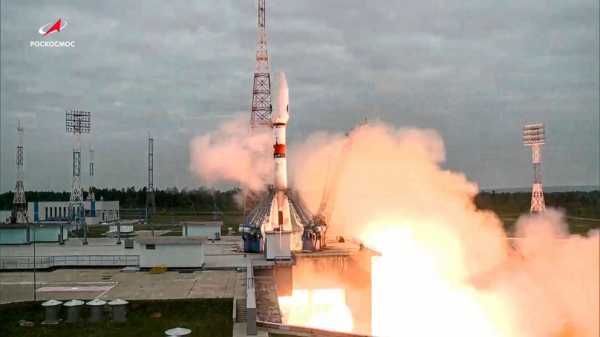
MOSCOW — Russia's Luna-25 spacecraft crashed into the moon after it spun into an uncontrolled orbit, the country's Roscosmos space agency said Sunday.
The pilotless spacecraft was aiming to be the first ever to land on the south pole of the moon, an area where scientists believe there could be important reserves of frozen water and precious elements. It had been expected to land Monday.
However, Roscosmos said it lost contact with the Luna-25 on Saturday after the spacecraft ran into difficulties and reported an “abnormal situation ”.
“The apparatus moved into an unpredictable orbit and ceased to exist as a result of a collision with the surface of the moon,” read a statement from the agency.
The Luna-25 was in a race with an Indian spacecraft launched on July 14 to be the first to reach the south pole. Both were expected to reach the moon between Aug. 21 and 23.
Vitaly Egorov, a popular Russian space analyst, said despite the crash the mission had some successes.
“Luna 25 showed important progress. It flew toward the Moon, carried out orbit correction, and tested onboard electronics and scientific tools," he said via videocall. "It even managed to collect some small scientific data during the flight and from the lunar orbit. It also sent photos of the Moon. Russian cosmonautics was not at this level before. But then, an error occurred somehow.”
The lunar mission was Russia’s first since 1976, when it was part of the Soviet Union. Only three governments have managed successful moon landings: the Soviet Union, the United States and China.
The lunar south pole is of particular interest to scientists, who believe the permanently shadowed polar craters may contain frozen water in the rocks that future explorers could transform into air and rocket fuel.
A previous Indian attempt to land at the south pole in 2019 ended when the spacecraft crashed into the moon’s surface.
Roscosmos said it wanted to show Russia “is a state capable of delivering a payload to the moon,” and “ensure Russia’s guaranteed access to the moon’s surface.”
Egorov said Roscosmos needs the experience of landing on the Moon.
“It will not be able to talk with China on equal terms, because China has already three successful landings on the moon, while Roscosmos has none,” he said. "Roscosmos will lag starkly behind the Chinese lunar program.”
Sanctions imposed on Russia since it began its actions in Ukraine have affected its space program, making it more difficult to access Western technology.
The Luna-25 was initially meant to carry a small moon rover but that idea was abandoned to reduce the weight of the craft for improved reliability, analysts said.
The craft launched from the Vostochny Cosmodrome in Russia’s Far East on Aug. 10. The spaceport is a pet project of Russian President Vladimir Putin and key to his efforts to make Russia a space superpower.
Sourse: abcnews.go.com





